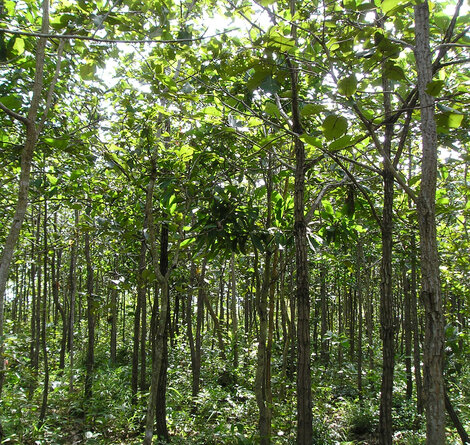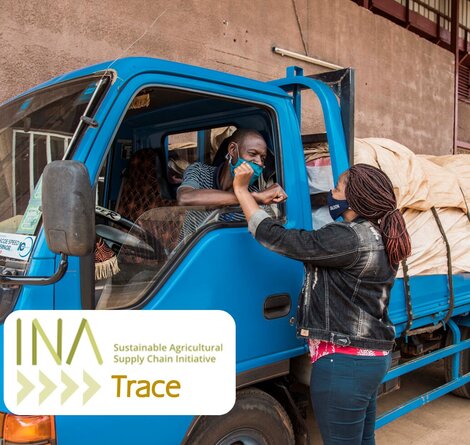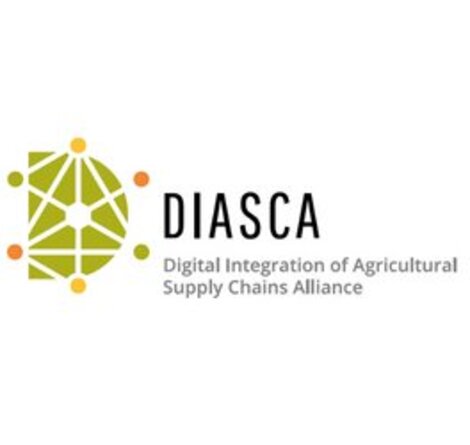Digitalisation & Traceability
The potential of digitalisation in agricultural supply chains
Digital technologies and applications make it possible to connect the rural population to global markets, innovations, services, knowledge and education. After all, far more than half of the world's population is online - and the trend is rising. The growth rate is highest in Africa. There, mobile phones in particular have a high potential. Today, about half of the African population owns a mobile phone.
Digitalisation can make a decisive contribution to improving the sustainability of global agricultural supply chains and promoting living conditions in rural areas. Information services on mobile devices give smallholder farmers access to modern farming methods, weather data and world market prices, which can lead to a resource-efficient increase in their crop yields, improved product quality and higher incomes.
Smallholder farmers can also benefit from digitalisation by gaining access to innovations, financial and insurance services as well as educational opportunities, e.g. on good agricultural practices.
By monitoring land use based on satellite data, changes in land use can be recognised. This can support measures to conserve forests and other natural resources by establishing deforestation-free supply chains.
Traceability systems
With the introduction of new legal requirements, such as the German Supply Chain Due Diligence Act (LKsG), the Corporate Sustainability Due Diligence Directive (CSDDD) or the EU Deforestation Regulation (EUDR), traceability and transparency in agricultural supply chains is becoming increasingly important. Digital traceability systems enable actors in agricultural supply chains to transparently monitor the flow of goods as well as key data on production, quality, processing stages and prices paid. By using these systems, information about the products can also be made available to consumers, fostering greater accountability and ethical sourcing.
Various types of traceability systems are available today, each catering to different needs. Proprietary systems, developed by private companies, offer tailored features and are often built with a focus on security and specific industry requirements. However, these closed-source solutions can lack flexibility and interoperability with other platforms. In-house built systems, on the other hand, are customized by organizations to fit their unique operational needs. While these tools provide a high level of control and customization, they require significant resources for development and ongoing maintenance.
Open-source traceability solutions offer a flexible alternative, encouraging adaptability and collaboration potential across industries. These systems allow users to modify and improve the software as needed, making them particularly valuable in dynamic and complex agricultural supply chains. Open-source tools foster a sense of community development and shared innovation, and they are often more accessible to smaller organizations or cooperatives with limited resources.
One such open-source solution is INATrace, which prioritizes transparency and the needs of smallholder farmers at the beginning of the supply chain.
Digital Public Infrastructure (DPI) and Interoperability
Due to an ever-growing number of traceability solutions on the market, the different systems are often unable to communicate with one another because the data is not compatible. This lack of interoperability of digital solutions means that farms and other supply chain actors have to collect, store and convert data multiple times, resulting in increased effort and costs. As a global multistakeholder partnership, the Digital Integration of Agricultural Supply Chain Alliance (DIASCA) has made it its mission to contribute towards building a Digital Public Infrastructure (DPI) in sustainable agricultural supply chains, for example by developing common data standards for traceability, forest monitoring and farm income. The aim is to optimise the flow of data between farm management apps, traceability tools, retailers' and brands' ERP systems, and enterprise resource planning systems, thereby enabling improved operations and more transparency in agricultural supply chains. DIASCA works to ensure that all actors in agricultural supply chains can benefit from the advantages of common standards and thus from improved processes and increased transparency.
The Digital Integration of Agricultural Supply Chains Alliance (DIASCA) is a global initiative aimed at transforming the digital landscape in agriculture. Recognizing the challenges posed by fragmented and siloed digital solutions, DIASCA works to create a more efficient, accessible, and interoperable ecosystem. Its mission extends beyond mere standardization, focusing on developing comprehensive Digital Public Infrastructure (DPI) for agricultural supply chains. This includes creating open standards, enabling rules, shared governance models, and open-source architecture. DIASCA prioritizes inclusivity, particularly for smallholder farmers, while benefiting all stakeholders from producers to retailers. The alliance concentrates on key areas such as traceability, forest monitoring, and farm income metrics. Through strategic partnerships with organizations like CGIAR, COSA, and the Forest Data Partnership, DIASCA leverages expertise to drive innovation. The initiative aligns with practical applications and sector-specific needs, engaging with national and international projects. As regulations like the EU Deforestation Regulation highlight the urgency for digital integration, DIASCA's work becomes increasingly crucial. By fostering interoperability and building shared digital infrastructure, DIASCA aims to reduce data redundancy, improve transparency, and create a more equitable digital agricultural landscape.
What is important in all of this is that farmers have access to these technologies and can also use them sustainably. In order to make digitisation fair and sustainable, the associated risks and challenges must be taken into account and counteracted. For this, the infrastructure must be expanded, access to hardware must be made possible and, above all, digital skills must be promoted in rural regions. Women in particular must be taken into account in order to reduce the risk of being left behind by digitalisation.
The Open Cocoa Chain: Promoting interoperable traceability solutions for the cocoa industry

Empowering sustainable cocoa farmers
90% of the world’s cocoa is produced by smallholder farmers. Despite an increasing consumer demand for sustainable cocoa, farmer incomes remain a small fraction of the retail price. Alongside low farmgate prices and a concentrated supply chain, a lack of information and market access worsen the economic precarity of cocoa farmers.
GIZ’s ‘Open Cocoa Chain’ innovation project supports farmers in improving their market position by making sustainable and deforestation-free cocoa visible in supply chains through a digital traceability solution. The project is implemented in Colombia and Peru together with the National Federation of Cocoa Farmers of Colombia (FEDECACAO) and Helvetas Swiss Intercooperation.
An inclusive digital innovation in the context of the EU Regulation on Deforestation

From 2025, the import of cocoa, coffee, palm oil, soy, cattle, natural rubber and timber into the European Union is limited to deforestation-free products under the EUDR. At farm level, GIZ’s ‘Open Cocoa Chain’ projects offers farmers the digital tools and trainings to document their cocoa as deforestation-free. As internet access can be an issue in rural areas, the tool can be used offline. The data will automatically be uploaded once the device is connected to the internet.
At supply-chain level, an open blockchain infrastructure allows for the transparent traceability of deforestation-free cocoa from farm to table. Farmer applications are connected to the blockchain to enable a smooth data exchange.
Moreover, women and young people play a key role in making food systems more inclusive and sustainable: the ‘Open Cocoa Chain’ project therefore addresses gendered inequalities regarding land use, digital literacy and decision-making within farms and rural communities through targeted farmer trainings and cooperations with women-led farms.
Transparency, long-term sustainability and scaling up innovation
Interoperability and transparency are at the core of GIZ’s ‘Open Cocoa Chain’ project. By bringing key actors in the cocoa industry such as cooperatives, traders, processing companies, and brands to the same table, the project promotes open data standards. Through initiatives like a National Round Table on Traceability in Colombia, GIZ and FEDECACAO facilitate exchange on transparent traceability in the cocoa sector. The open and interoperable blockchain infrastructure ensures long-term sustainability and the up-scaling of the innovation: companies and organization can link their monitoring systems to the ‘Open Cocoa Chain’ through application programming interfaces.



